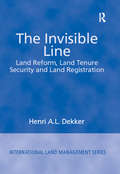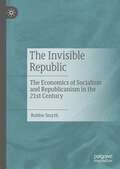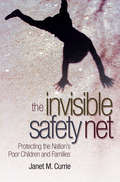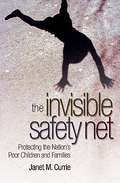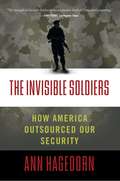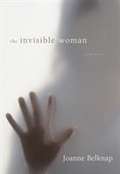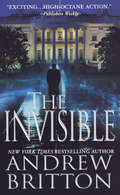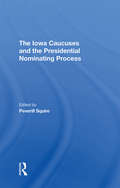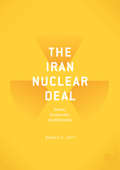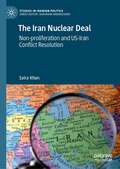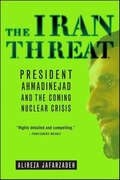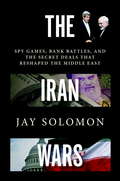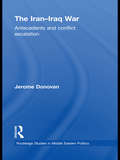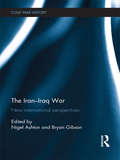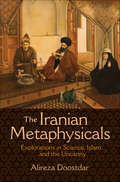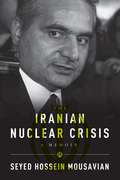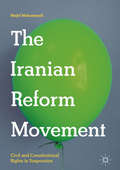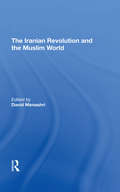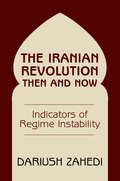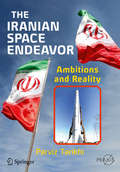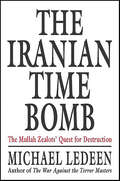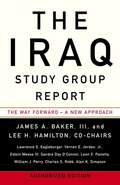- Table View
- List View
The Invisible Line: Land Reform, Land Tenure Security and Land Registration (International Land Management Series)
by Henri A.L. DekkerDuring the past two decades, there has been a resurgence of interest in issues of land reform in developing and transitional countries. This has been initiated by the large-scale re-distributive activities in former communist countries and by the growing number of claims by displaced indigenous population groups to restore their rights to land. This book provides a timely and clear overview of the historical and theoretical context of current land reform and tenure issues. Illustrated with global case studies from Europe, Asia, Africa and Latin America, key sections explore land and rights to land, property, land tenure and reform, and land registration. Beginning by discussing the need to demarcate space by creating 'invisible lines' - which give certainty to what extent authority over land can be established - the book then explores legal and theoretical definitions of 'land' and 'property' and looks at the various different policies and forms of land tenure. One of the most recent developments in land reform policy has been to look to traditional forms of access to land and of resource conservation. The book argues that, while such policies on land property rights have great potential, they are best being adopted in a long-term, incremental way. It also shows how land policy reforms must be embedded in institutional and general policy reforms, complemented by rural development and educational opportunities for beneficiaries. The book summarises the main principles of land reform activities and practices and argues that the perception of land tenure security is the most critical factor of success to land reform.
The Invisible Republic: The Economics of Socialism and Republicanism in the 21st Century
by Robbie SmythThe book establishes a philosophical base for the economic principles of Irish republicanism in the 21st century. It traces these from their late 18th century origins to the present day. It is unique in terms of contemporary books about Irish republicanism. There has been a dearth of economic analysis of the republican position since the creation of the modern Irish state in 1922.The book makes a link between the politics of Tone, Davis, Lalor, Connolly and Pearse through the economic experience of people living and working in not just Ireland but around the world today. The examples are contemporary but the ideological basis stretches from the present day back through the last 250 years of developing Irish republican thought.It identifies a series of key contemporary economic issues and gives a socialist republican perspective on possible solutions and strategies. Ultimately it provides a recalibration of the principles of socialism and republicanism in the 21st century.
The Invisible Safety Net: Protecting the Nation's Poor Children and Families
by Janet CurrieIn one of the most provocative books ever published on America's social welfare system, economist Janet Currie argues that the modern social safety net is under attack. Unlike most books about antipoverty programs, Currie trains her focus not on cash welfare, which accounts for a small and shrinking share of federal expenditures on poor families with children, but on the staples of today's American welfare system: Medicaid, Food Stamps, Head Start, WIC, and public housing. These programs, Currie maintains, form an effective, if largely invisible and haphazard safety net, and yet they are the very programs most vulnerable to political attack and misunderstanding. This book highlights both the importance and the fragility of this safety net, arguing that, while not perfect, it is essential to fighting poverty. Currie demonstrates how America's safety net is threatened by growing budget deficits and by an erroneous public belief that antipoverty programs for children do not work and are riddled with fraud. By unearthing new empirical data, Currie makes the case that social programs for families with children are actually remarkably effective. She takes her argument one step further by offering specific reforms--detailed in each chapter--for improving these programs even more. The book concludes with an overview of an integrated safety net that would fight poverty more effectively and prevent children from slipping through holes in the net. (For example, Currie recommends the implementation of a benefit "debit card" that would provide benefits with less administrative burden on the recipient.) A complement to books such as Barbara Ehrenreich's bestselling Nickel and Dimed, which document the personal struggles of the working poor, The Invisible Safety Net provides a big-picture look at the kind of programs and solutions that would help ease those struggles. Comprehensive and authoritative, it will prompt a major reexamination of the current thinking on improving the lives of needy Americans.
The Invisible Safety Net: Protecting the Nation's Poor Children and Families
by Janet M. CurrieIn one of the most provocative books ever published on America's social welfare system, economist Janet Currie argues that the modern social safety net is under attack. Unlike most books about antipoverty programs, Currie trains her focus not on cash welfare, which accounts for a small and shrinking share of federal expenditures on poor families with children, but on the staples of today's American welfare system: Medicaid, Food Stamps, Head Start, WIC, and public housing. These programs, Currie maintains, form an effective, if largely invisible and haphazard safety net, and yet they are the very programs most vulnerable to political attack and misunderstanding. This book highlights both the importance and the fragility of this safety net, arguing that, while not perfect, it is essential to fighting poverty. Currie demonstrates how America's safety net is threatened by growing budget deficits and by an erroneous public belief that antipoverty programs for children do not work and are riddled with fraud. By unearthing new empirical data, Currie makes the case that social programs for families with children are actually remarkably effective. She takes her argument one step further by offering specific reforms--detailed in each chapter--for improving these programs even more. The book concludes with an overview of an integrated safety net that would fight poverty more effectively and prevent children from slipping through holes in the net. (For example, Currie recommends the implementation of a benefit "debit card" that would provide benefits with less administrative burden on the recipient.) A complement to books such as Barbara Ehrenreich's bestselling Nickel and Dimed, which document the personal struggles of the working poor, The Invisible Safety Net provides a big-picture look at the kind of programs and solutions that would help ease those struggles. Comprehensive and authoritative, it will prompt a major reexamination of the current thinking on improving the lives of needy Americans.
The Invisible Soldiers: How America Outsourced Our Security
by Ann HagedornThe urgent truth about the privatization of America's national security that exposes where this industry came from, how it operates, where it's heading--and why we should be concerned.Thirty years ago there were no private military and security companies (PMSCs); there were only mercenaries. Now the PMSCs are a bona-fide industry, an indispensable part of American foreign and military policy. PMSCs assist US forces in combat operations and replace them after the military withdraws from combat zones; they guard our embassies; they play key roles in US counterterrorism strategies; and Homeland Security depends on them. Their services include maritime security, police training, drone operations, cyber security, and intelligence analysis (as Edward Snowden has famously revealed). Even the United Nations employs them.When did this happen? The turning point came when the US found itself in a prolonged war with Iraq, but without adequate forces. So the Bush Administration turned to the PMSCs to fill the gap. Private contractors and subcontractors eventually exceeded the traditional troops. The industry has never scaled back. Ann Hagedorn profiles the members of Congress who recognize the dangers of dependence on PMSCs, but have been unable to limit them or even determine their true scope. She takes us to the exclusive club in London where the PMSCs were created, and she reveals the key figure in the evolution of the industry. She introduces us to a US Army general who studies new developments, such as PMSCs' drone operations, and worries about PMSCs potentially fighting American troops. The Invisible Soldiers will inspire a national dialogue about a little-known international industry on which our security rests.
The Invisible Woman: Gender, Crime, and Justice (Fourth Edition) (Wadsworth Contemporary Issues in Crime and Justice)
by Joanne BelknapTHE INVISIBLE WOMAN: GENDER, CRIME, AND JUSTICE is the definitive guide on women and the criminal justice system, focusing on female offenders and their treatment by the criminal justice system, female victims of crime, and female employees of criminal justice system agencies. Thoroughly updated with new research and statistics, the fourth edition covers such timely and important topics as restorative justice, gender-responsive programming, sex trafficking, pathways research, Intimate Partner Abuse (IPA)/Domestic Violence (DV), and stalking.
The Invisible: The American; The Assassin; The Invisible; The Exile (A\ryan Kealey Thriller Ser. #3)
by Andrew BrittonTensions between Pakistan and India are at an all-time high. To complicate matters, twelve American climbers have disappeared in Pakistan's Hindu Kush range. As the conflict escalates, the U.S. Secretary of State's motorcade is ambushed on the outskirts of Islamabad. When her back-up team arrives, they discover a disastrous scene: dozens are dead, including seven diplomatic security agents, and the secretary of state has vanished without a trace.In the wake of the unprecedented attack, CIA agent Ryan Kealey's operation goes into high gear. Naomi Kharmai, the British-born analyst who has taken on a daring new role with the Agency, is on his team again. But Kharmai is becoming increasingly unpredictable, and as they work their way toward the target, it becomes clear to Kealey that anyone is fair game--and no one can be trusted.Thundering to a stark and chilling climax, The Invisible raises the stakes on every page. A crackingly intelligent thriller, it is filled with shocking betrayal and, ultimately, revenge.Praise for Andrew Britton and his novels. . ."Brilliantly well-written. . .a sizzling page-turner." --Brad Thor, New York Times bestselling author of Blowback and State of the Union"Terrifying and gripping." --Stephen Frey, New York Times bestselling author of The Successor"In this age of terrorism, [Britton's] plots seem to jump straight out of the headlines." --St. Louis Post Dispatch "Exciting. . .high-octane action."--Publishers Weekly
The Involvement of State Governments in US Foreign Relations
by Samuel Lucas McmillanOffering conclusions for improving intergovernmental relations, determining international economic development strategies, and showing how many subnational governments are involved in world politics, this book examines how US states and governors connect to American foreign relations, tracing activities that began in the 1950s and have expanded with globalization. Chapters explain governors' foreign relations activities in political, economic, and defense contexts and how US states compete in the global economy. The book analyzes US states' ability to attract foreign investment and promote exports, making use of statistical analysis and personal interviews with state officials in the United States and posted abroad.
The Iowa Caucuses And The Presidential Nominating Process
by Peverill SquireThis book aims to better explain the Iowa caucuses and presents updated versions of the papers presented at a Shambaugh conference, "First in the Nation: Iowa and the Nomination Process," held at the University of Iowa, February 7-8, 1988.
The Iran Hostage Crisis (Cornerstones of Freedom)
by R. Conrad SteinTehran, Iran. November 4, 1979. 52 American people living in Tehran are taken hostage. President Carter later wrote, "[At first] we were deeply disturbed, but reasonably confident that the Iranian authorities would soon remove the attackers from the embassy compound and release our people." Yet it would be another 444 days before they were released.
The Iran Nuclear Deal
by Dennis C. JettThis book examines attempts to influence the outcome of the negotiations between Iran and the United States over Iran's nuclear capabilities. In particular, it focuses on struggles within the United States around public and congressional opinion with regard to the accord. Trying to prevent a successful outcome to the talks became a cottage industry in Washington, with the casino billionaire Sheldon Adelson being just one of those who were pouring millions of dollars into the effort. On the pro-diplomacy side, there were a wide range of religious, peace, and arms control groups with some financial support coming from the Ploughshares Fund trying to create the space for a negotiated agreement. The tactics of both sides of the debate are described and analyzed to show how a contentious foreign policy issue can become not just a decision for high-level government decision makers, but a wide-ranging fight that involves scores of nongovernmental organizations, the media, and thousands of activists.
The Iran Nuclear Deal: Non-proliferation and US-Iran Conflict Resolution (Studies in Iranian Politics)
by Saira KhanThis book delves deep into the complex dynamics surrounding the Iran nuclear deal and its subsequent fracture. In a post-2018 world, following the United States’ withdrawal from the 2015 Iran nuclear agreement, this work dissects the ramifications of this geopolitical shift, particularly with respect to Iran's nuclear ambitions. The book's central premise revolves around the idea that Iran's pursuit of nuclear capabilities is intricately tied to its enduring conflicts with Iraq, Israel, and the United States. It argues that the nuclear deal had the potential to quell these conflicts, particularly the long-standing rivalry between Iran and the U.S., thus reshaping Iran's relationships in the Middle East. However, with the U.S. exit from the agreement and its accusations of Iranian sponsorship of terrorism, Iran now perceives a heightened threat, potentially leading it to consider nuclear weapons as a deterrent against a potential war with the U.S. The book challenges conventional international relations paradigms with regards to Iran: realism, which typically predicts all conflicting states will seek nuclear weapons regardless of cooperative arrangements, is shown to ignore the nuanced connection between cooperation and proliferation propensity; and liberalism's emphasis on cooperation is critiqued in this case for overlooking the negative consequences of failed cooperative endeavours. The book highlights the importance of trust and compliance in the success of cooperative agreements, as well as the adverse effects of their breakdown. The work contributes significantly to our understanding of international relations in the Middle East. It draws on an extensive examination of prior research while presenting novel theoretical insights. The detailed case study of Iran's nuclear aspirations before, during, and after the nuclear deal serves as a compelling application of the theoretical framework. Finally, the book provides an in-depth exploration of the intricate web of geopolitics, trust, and cooperation that has shaped the trajectory of Iran's nuclear ambitions. It offers not only theoretical contributions to the field of international relations but also valuable policy insights for managing this critical international issue.
The Iran Threat: President Ahmadinejad and the Coming Nuclear Crisis
by Alireza JafarzadehFrom the controversial expert who brought Iran's nuclear program to the attention of the world in 2002 comes a searing exposé of the inner workings and plans of Iran's mullahs. With access to dissident groups inside Iran, Alireza Jafarzadeh traces President Ahmadinejad's radical roots and involvement in terror attacks to his impact on Iran's weapons program. He reveals new details on Iran's meddling in Iraq and its broader goals for the future of the Middle East. This is the most authoritative account to date of the looming threat Iran poses to the United States and the Gulf region.Readers will learn for the first time:*President Ahmadinejad's radical past as a feared torturer of political prisoners and his zealous mission to deliver the regime its first nuclear bomb*The chilling trend of the military's increasing control of the nuclear program *How Ahmadinejad was handpicked by Iran's mullahs to help create an Islamic Republic in Iraq *The latest covert actions to bury nuclear facilities in tunnels*The story of the front companies Iran used to buy its nuclear technology undetected*The author's original and insightful policy options to end the Iranian threat
The Iran Wars: Spy Games, Bank Battles, Secret Deals-and What Comes Now
by Jay SolomonFrom the Wall Street Journal reporter who's been breaking news on the historic and potentially disastrous Iran nuclear deal comes a deeply reported exploration of the country's decades-long power struggle with the United States--for readers of Steve Coll's Ghost Wars and Lawrence Wright's The Looming Tower For more than a decade, the United States has been engaged in a war with Iran as momentous as any other in the Middle East--a war all the more significant as it has largely been hidden from public view. Through a combination of economic sanctions, global diplomacy, and intelligence work, successive U.S. administrations have struggled to contain Iran's aspirations to become a nuclear power and dominate the region--what many view as the most serious threat to peace in the Middle East. Meanwhile, Iran has used regional instability to its advantage to undermine America's interests. The Iran Wars is an absorbing account of a battle waged on many levels--military, financial, and covert. Jay Solomon's book is the product of extensive in-depth reporting and interviews with all the key players in the conflict--from high-ranking Iranian officials to Secretary of State John Kerry and his negotiating team. With a reporter's masterly investigative eye and the narrative dexterity of a great historian, Solomon shows how Iran's nuclear development went unnoticed for years by the international community only to become its top security concern. He catalogs the blunders of both the Bush and Obama administrations as they grappled with how to engage Iran, producing a series of both carrots and sticks. And he takes us inside the hotel suites where the 2015 nuclear agreement was negotiated, offering a frank assessment of the uncertain future of the U.S.-Iran relationship. This is a book rife with revelations, from the secret communications between the Obama administration and the Iranian government to dispatches from the front lines of the new field of financial warfare. For readers of Steve Coll's Ghost Wars and Lawrence Wright's The Looming Tower, The Iran Wars exposes the hidden history of a conflict most Americans don't even realize is being fought, but whose outcome could have far-reaching geopolitical implications.Praise for The Iran Wars "The use of the word 'wars,' plural, in the title of this illuminating book tells the story: U.S.-Iranian relations have been troubled for many years. This deeply researched account of negotiations and their implications makes an important contribution to understanding the short- and long-term consequences of how we manage this difficult relationship."--George P. Shultz, former secretary of state"An illuminating, deeply reported account from one of the best journalists writing about the Middle East today. Jay Solomon's The Iran Wars offers a front-row view of the spy games, assassinations, political intrigue and high-stakes diplomacy that have defined relations with one of America's most cunning and dangerous foes."--Joby Warrick, Pulitzer Prize-winning author of Black Flags: The Rise of ISIS"A thorough yet concise survey of Iran's buildup of nuclear technology since the 1980s, its troubling exporting of Shiite insurgency in countries around it, and the changing American reaction. Wall Street Journal chief foreign affairs correspondent [Jay] Solomon offers an evenhanded look at the backdoor schemes involving the building of Iran's nuclear weapons and the world players involved in and against its machinations."--Kirkus Reviews (Starred Review)From the Hardcover edition.
The Iran-Iraq War
by Pierre RazouxFrom 1980 to 1988 Iran and Iraq fought the longest conventional war of the century. It included tragic slaughter of child soldiers, use of chemical weapons, striking of civilian shipping, and destruction of cities. Pierre Razoux offers an unflinching look at a conflict seared into the region's collective memory but little understood in the West.
The Iran-Iraq War: Antecedents and Conflict Escalation (Routledge Studies in Middle Eastern Politics)
by Jerome DonovanIn a tradition that dates back to the time of Thucydides, and the Peloponnesian War, the systematic examination of conflict and war has long been a preoccupation of political scientists seeking to resolve the enduring question: Why do wars occur? This study directly engages this question with a specific focus on explaining the conflict between Iran and Iraq, arguably the longest and one of the more costly conventional wars of the twentieth century. Explaining the systemic nature of conflict within the Middle East, and specifically between Iran and Iraq, the book illustrates how IR theory can be utilised in explaining conflict dynamics in the Middle East. The author’s integrated approach to understanding interstate conflict escalation demonstrates that when taken together issues, interaction and power capabilities lend themselves to a much richer account of the dyadic relationship between Iran and Iraq in the lead up to war in 1980. Addressing a disparity between international relations and Middle Eastern area studies, this book fills an important gap in the existing scholarly literature on the causes of war. As such, it will be of great interest to scholars of peace and conflict studies, Middle Eastern studies and International Relations.
The Iran-Iraq War: New International Perspectives (Cold War History)
by Nigel Ashton Bryan GibsonThis volume offers a wide-ranging examination of the Iran–Iraq War (1980–88), featuring fresh regional and international perspectives derived from recently available new archival material. Three decades ago Iran and Iraq became embroiled in a devastating eight-year war which served to re-define the international relations of the Gulf region. The Iran–Iraq War stands as an anomaly in the Cold War era; it was the only significant conflict in which the interests of the United States and Soviet Union unwittingly aligned, with both superpowers ultimately supporting the Iraqi regime. The Iran–Iraq War re-assesses not only the superpower role in the conflict but also the war’s regional and wider international dimensions by bringing to the fore fresh evidence and new perspectives from a variety of sources. It focuses on a number of themes including the economic dimensions of the war and the roles played by a variety of powers, including the Gulf States, Turkey, France, the Soviet Union and the United States. The contributions to the volume serve to underline that the Iran–Iraq war was a defining conflict, shaping the perspectives of the key protagonists for a generation to come. This book will be of much interest to students of international and Cold War history, Middle Eastern politics, foreign policy, and International Relations in general.
The Iranian Metaphysicals: Explorations in Science, Islam, and the Uncanny
by Alireza DoostdarWhat do the occult sciences, séances with the souls of the dead, and appeals to saintly powers have to do with rationality? Since the late nineteenth century, modernizing intellectuals, religious leaders, and statesmen in Iran have attempted to curtail many such practices as "superstitious," instead encouraging the development of rational religious sensibilities and dispositions. However, far from diminishing the diverse methods through which Iranians engage with the immaterial realm, these rationalizing processes have multiplied the possibilities for metaphysical experimentation. The Iranian Metaphysicals examines these experiments and their transformations over the past century. Drawing on years of ethnographic and archival research, Alireza Doostdar shows that metaphysical experimentation lies at the center of some of the most influential intellectual and religious movements in modern Iran. These forms of exploration have not only produced a plurality of rational orientations toward metaphysical phenomena but have also fundamentally shaped what is understood as orthodox Shi‘i Islam, including the forms of Islamic rationality at the heart of projects for building and sustaining an Islamic Republic. Delving into frequently neglected aspects of Iranian spirituality, politics, and intellectual inquiry, The Iranian Metaphysicals challenges widely held assumptions about Islam, rationality, and the relationship between science and religion.
The Iranian Nuclear Crisis
by Seyed Hossein MousavianThe first detailed Iranian account of the diplomatic struggle between Iran and the international community, The Iranian Nuclear Crisis: A Memoir opens in 2002, as news of Iran's clandestine uranium enrichment and plutonium production facilities emerge. Seyed Hossein Mousavian, previously the head of the Foreign Relations Committee of Iran's Supreme National Security Council and spokesman for Tehran's nuclear negotiating team, brings the reader into Tehran's private deliberations as its leaders wrestle with internal and external adversaries.Mousavian provides readers with intimate knowledge of Iran's interactions with the International Atomic Energy Agency and global powers. His personal story comes alive as he vividly recounts his arrest and interrogations on charges of espionage. Dramatic episodes of diplomatic missions tell much about the author and the swirling dynamics of Iranian politics and diplomacy-undercurrents that must be understood now more than ever.As intense debate continues over the direction of Iran's nuclear program, Mousavian weighs the likely effects of military strikes, covert action, sanctions, and diplomatic engagement, considering their potential to resolve the nuclear crisis.Contents1. The Origin and Development of Iran's Nuclear Program2. The First Crisis3. From Tehran to Paris4. From the Paris Agreement to the 2005 Presidential Election5. The Larijani Period6. To the Security Council7. Back to the Security Council and a New Domestic Situation8. Iran Alone: The Jalili Period9. U.S. Engagement10. The Crisis Worsens11. Conclusion
The Iranian Reform Movement: Civil and Constitutional Rights in Suspension
by Majid MohammadiThis book analyzes the reform movement in Iran and traces its political roots from the beginning of the 20th century to its relative demise with the purging of the Green Movement after the 2009 disputed elections. The author explains how this movement was shaped in a country with an authoritarian Islamist regime, how it grew, and what its achievements are, including its failures and setbacks. The project will appeal to scholars and students in the fields of Middle Eastern politics and sociology, Iranian politics, democracy, and the US-Iran relations.
The Iranian Revolution And The Muslim World
by David MenashriThis book delineates the Islamic revolution's impact mainly on the Muslim Middle East and examines the first decade of the revolution. It deals with the repercussions of the revolution in several Shi'i communities and examines Sunni polemical writings on the Shi'a and the Iranian revolution.
The Iranian Revolution Then And Now: Indicators Of Regime Instability
by Dariush ZahediIn The Iranian Revolution Then and Now , Dariush Zahedi assesses the Islamic Republic's potential for revolution through an in-depth, theoretically informed, comparative analysis of the present with 1979 pre-Revolutionary Iran. Zahedi discusses how the potential for a revolutionary coup is based on two things: the inherent defects and vulnerabilities in the regime and the coordinated actions of the social groups and individuals opposed to the regime. He also identifies two ideal-typical forms of revolutionary change. }In The Iranian Revolution Then and Now , Dariush Zahedi assesses the Islamic Republic's potential for revolution through an in-depth, theoretically informed, comparative analysis of the present with 1979 pre-Revolutionary Iran. Zahedi discusses how the potential for a revolutionary coup is based on two things: the inherent defects and vulnerabilities in the regime and the coordinated actions of the social groups and individuals opposed to the regime. He also identifies two ideal-typical forms of revolutionary change (the regime collapses on its own, or, the regime is overthrown). He concludes that the chances for overthrowing the present regime are moderate. }
The Iranian Space Endeavor
by Parviz TarikhiProvides a detailed look at the events and policies surrounding the Iranian space endeavor. For those who see the trend of progress and movement of the Iranian space endeavor from the outside, it can be difficult to understand what goes on behind the scenes. However, for one who observes these events firsthand, they take on a very different meaning. In this book, the author brings new and different profiles of Iran's space endeavor to light. Iran claims to be the ninth leading country in the world capable of manufacturing satellites and launching them, plans to land an astronaut on the Moon within a decade, and says its own president plans to be the first Iranian astronaut to travel into space. The author explains in this book that not all of these claims are quite as they seem. In addition to technical explanations, the book also includes historical, legal, social and cultural aspects of Iran's space program as well. It is the author's goal to create a tangible feeling of Iran's space endeavor for the readers.
The Iranian Time Bomb: The Mullah Zealots' Quest for Destruction
by Michael LedeenThe War Against the Terror Masters is a must-read guide to the terrorist crisis. Michael A. Ledeen explains in startling detail how and why the United States was so unprepared for the September 11th catastrophe; the nature of the terror network we are fighting--including the state sponsors of that network; the role of radical Islam; and the enemy collaboration of some of our traditional Middle Eastern "allies";--and, most convincingly, what we must do to win the war.The War Against the Terror Masters examines the two sides of the war: the rise of the international terror network, and the past and current efforts of our intelligence services to destroy the terror masters in the U.S. and overseas. Ledeen's new book also visits every country in the Near East and describes the terrorist cancers in each. Among many revelations that will attract wide attention: *How the terror network survived the loss of its main sponsor, the Soviet Union. *How the FBI learned from a KGB defector--twenty years before Osama's bin Laden's murderous assault--of the existance of Arab terrorist sleeper networks inside the United States. *How moralistic guidelines straight-jacketed the FBI from even collecting a file of newspaper clippings on known terror groups operating in America. *How the internal culture of the CIA, and severe limitations on its ability to operate, blinded us to the growth of terror networks. And much more.
The Iraq Study Group Report
by Sandra Day O'Connor Lee H. Hamilton Lawrence S. Eagleburger Leon E. Panetta William J. Perry Charles S. Robb Alan K. Simpson James A. Baker III Vernon E. Jordan Jr. Edwin Meese IIIThe findings and proposals for improving security, strengthening the new Iraqi government, rebuilding its economy, and maintaining stability in the region.
